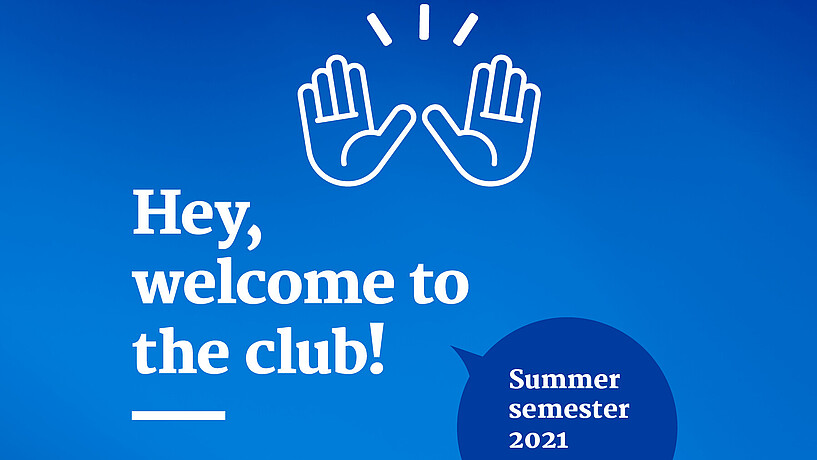The pandemic put a premature end to her travel plans. 'After my Abitur I wanted to explore Asia,' says Johanna Schedukat. She travelled to Vietnam, Indonesia and Japan, but two months later it was all over. 'It was still a super experience,' the 20-year-old says. Then, in November 2020, the Flensburg native started her Media and Information degree at HAW Hamburg.
Starting university studies with an extra portion of courage

Her enthusiasm about life as a student in the big city, though, was dampened by the virus. Of course, orientation weeks are still being held at the start of studies, even in the pandemic, but they are mostly digital. In Johanna's case the orientation was three days, two of which took place online. 'I was really preoccupied with how I would be able to meet nice people at a distance.' The requirement to wear a mask and maintain physical distance have created entirely new barriers.
Trust yourself and dare to take the first step
While conversation normally takes place naturally and easily during orientation week, an extra portion of courage is now needed to meet 'strangers'. 'For me that meant leaving my comfort zone and approaching others.'
What seemed difficult to her at first, however, turned out to be very easy after the first step. 'Other people are often even more shy and are happy if someone starts talking to them.' Though this first step also takes courage when taken digitally, it is very helpful, says Johanna: 'Just write to a fellow student and make a plan to meet at the mensa or at the campus. Then you can find out together how everything works and this gives you something to talk about right away.'
Because 'first-year' parties or even just hanging out at a local restaurant at the end of a day together weren't possible, Johanna's orientation group organised a virtual meeting 'over a beer', and Johanna used the call as an opportunity to arrange to meet up with a fellow student to cook. 'That was really nice. The virtual beer couldn't completely overcome the distance, but our joint participation brought the two of us together.'

Support service: The Student Counselling Office
Especially for new students, the pandemic-related restrictions on contact can create the feeling of having to go it alone. 'But nobody has to do that,' promises Stefanie Kieback, deputy head of the Student Counselling Office at HAW Hamburg. 'Anyone who has a problem can come to us. Whether it has to do specifically with studies – for example, learning difficulties or a lack of motivation – or with private issues such as relationship crises, bereavement or anxiety, we try to look together at what next steps could be helpful.'
Depending on the problem, the Student Counselling Office works closely with other internal and external support services, such as the Confidential Dispute Advising Office and the Family Office. 'And of course the discussions are free of charge and treated as strictly confidential,' Kieback emphasises. She also recommends seeking support early on. So again, it is important to trust yourself and dare to take the first step – after that it gets easier.
How do I organise my day?
What is also not easy for many is studying in online courses and at their own pace. These questions result: How do I structure my day? Where should I set up my laptop? And how do I keep from getting distracted? Kieback knows that everyone learns differently. 'While for most people the classic study setting at a desk is helpful, I, for example, liked studying at the kitchen table of my communal apartment the best – at the centre of the action,' says the expert.
However, she recommends set study times to structure the day, as well as rituals. 'For example, going for a walk around the block after breakfast and then starting the (study) day. Or making a date with fellow students for an online check-in in the morning or a check-out in the evening, followed by a little reward.' These kinds of routines make it easier to be organised, disciplined and, above all, motivated, says Kieback.
Johanna confirms this. After getting up, she first does a round of exercise, then takes a shower so she is fresh and awake for the online seminars. She always sits at her desk, with water and a few snacks nearby. 'Of course the idea of logging in from bed one minute before the lecture starts is appealing, but a certain amount of study routine just helps,' she says.
There are really good apps to prevent digital distractions.
Set yourself goals for the day
Kieback recommends that those who have difficulties establishing a routine get dressed especially for studying. 'It's about developing an internal mindset regarding work and taking it seriously. Changing your clothes – in the morning and the evening – can help.' And the psychologist also recommends setting goals for the day, ideally based on the SMART formula: specific, measurable, attractive, realistic and time-bound. 'Instead of saying "Today I'm going to do math", it's better to make a concrete plan: "This morning I'm going to solve three math problems."'
But what about when a text from your best friend arrives right in the middle of the third problem? Or a link to a video that's going viral? Resisting distractions from the Internet isn't easy. 'There are really good apps to prevent digital distractions,' says Kieback with a wink. She knows that 'quickly checking your chats or a short look at YouTube' can be serious time wasters, which even the best time management can't beat.
However, those who give in to temptation despite their best intentions shouldn't be too hard on themselves, especially now. 'The pandemic is demanding a lot from all of us. So when one day doesn't work out the way you planned, the next one will be better,' says Kieback reassuringly. And if not, the Student Counselling Office can help.
Text: Yvonne Scheller
Where can I get support at the start of the semester?
If you are attending an orientation unit or spending time at HAW Hamburg, please note that you are required to wear a medical mask at all of the campuses, even outside the buildings!
Additional information
Orientation units and preliminary courses
FAQs about starting your studies
Student counselling and coaching
Coronavirus update for students
The HAW Hamburg Student Counselling Office is the central provider of support services for students and prospective students and offers assistance with all questions related to your studies or in the case of personal problems. The discussions are free of charge and are treated as strictly confidential. You can get in touch via email, phone or in person:
